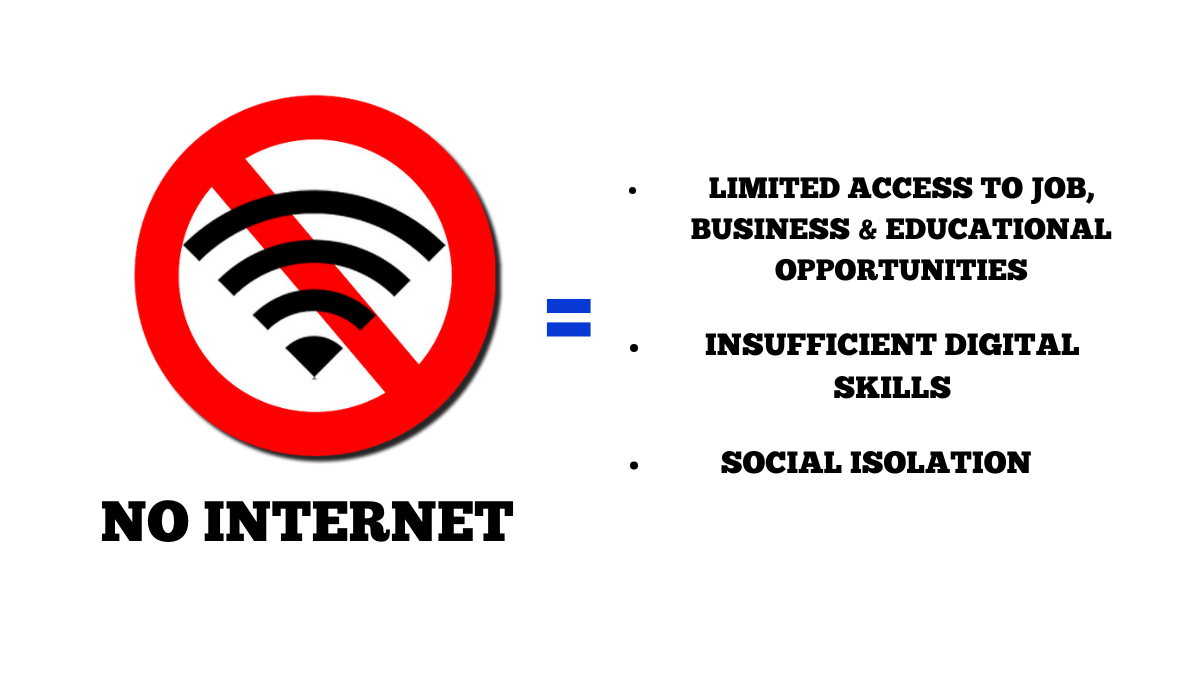What Does Being Offline Really Cost?
Being “offline” is when an individual is not connected to a computer network or the internet. It is above missing out on trends or viral social media content. The individual’s mobile or computer device is disconnected from the online world. In Nigeria, where there are still some concerns about digital inclusion, being offline can mean losing out on important opportunities, information, services, and even safety nets.
As of May 2025, Nigeria’s internet penetration rate stood at 48.81%, which was the highest rate in the past five years, according to the Nigerian Communications Commission (NCC) (Punch Nigeria). Nevertheless, this also means that over half of the population is still offline, which exposes them to limited access to job & business opportunities, missing educational opportunities, exclusion from financial services, health risks from lack of information, and so on.
This article discusses six hidden costs of being offline in Nigeria, mainly for those who are yet to understand why digital access is not just a luxury but rather a necessity.
- Limited Access to Job & Business Opportunities
The world has now become digital with opportunities to work remotely with companies around the world and to also execute businesses with partners globally, right from one’s house. Being offline can therefore mean losing potential job vacancies, freelancing platforms, or online businesses. Platforms like LinkedIn, Upwork, Fiverr, Freelancer, Jumia, and Konga are major places for remote job opportunities and business deals today. This leads offline citizens to be locked out of this growing job marketplace.
Hidden Cost: Fewer jobs, fewer online businesses, lower income, and exclusion from remote work opportunities.
- Missing Educational Opportunities
Online learning is currently taking over. Thanks to educational platforms like Udemy, Coursera, Alison, uLesson, and YouTube, which now provide access to top-notch education, even for free.
Being offline hinders access to modern learning tools and test-prep materials like JAMB CBT in rural areas where education is currently underfunded.
Hidden Cost: insufficient skills, lower career prospects, and poor academic performance.
- Exclusion from Financial Services
People now have more control over their finances, and the cost of transactions is reducing with fund transfers, mobile banking, and online savings apps such as PiggyVest, Kuda, and Opay.
Those who do not have access to the internet rely on cash and physical banking, which is very inconvenient, considering the long-distance walk and queues in the bank.
Hidden Cost: lack of access to a quick loan, high transaction costs, and financial insecurity.
- Difficulty Accessing Government Services
A lot of government services are now provided online, requiring internet access. Examples of such government services are tax payment, driver’s license renewal, NIN registration, utility bill payment, etc. Those who do are not digitally literate or without internet access must pay agents or middlemen (sometimes three times the real cost) just to fill out basic forms.
Hidden Cost: exploitation by agents, unnecessary fees, and time wasted.
- Health Risks from Lack of Information
Some online platforms like Mayo Clinic, AskNaijaDoctor, WebMD, and even WhatsApp groups help people learn helpful health tips and also identify health symptoms quickly at its early stage. These platforms also guide in locating nearby pharmacies and clinics.
A lot of Nigerians who were not online during the COVID-19 pandemic did not get quick updates about symptoms, vaccinations, or safety precautions, which caused lack of information or misinformation.
Hidden Cost: lack of information, misinformation, delayed treatment, and preventable illnesses.
- Social Isolation
Presently, people mostly use Facebook, Instagram, Zoom, and WhatsApp to keep in touch with friends and family, particularly while they live far apart. Offline Nigerians, especially the elderly or those in rural areas, may experience disconnection or loneliness, which could ultimately lead to mental health issues.
Hidden Cost: depression, social exclusion, and loneliness.
Conclusion: Why Digital Inclusion Matters
In Nigeria, being offline is costly, and this is conclusive.
It means paying more, earning less, and missing out on life-changing opportunities. The internet is not a luxury, but a lifeline for the low-income earners, the rural majority, the elderly, the uneducated.
To bridge this digital gap, we need to make investments in:
- Affordable internet and smartphones.
- Digital skills training in local languages.
- Digital community hubs.
See this as a privilege if you are reading this online. Meanwhile, there is also a need to support others in connecting to the internet.
Being offline in Nigeria costs more than data itself today. It also costs lives.

